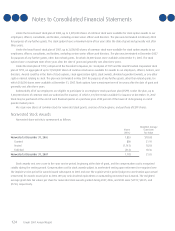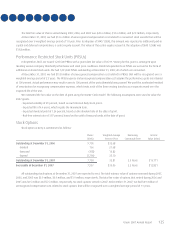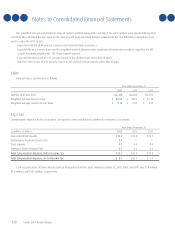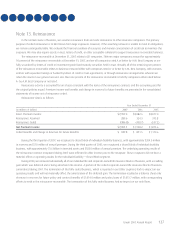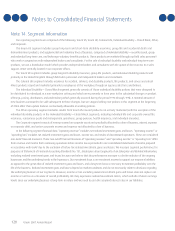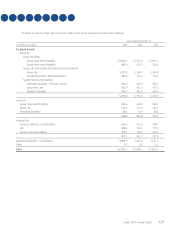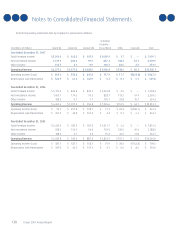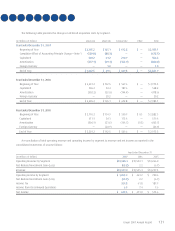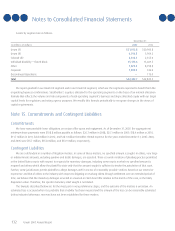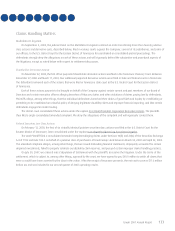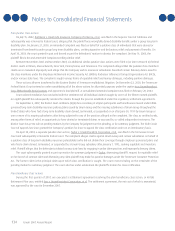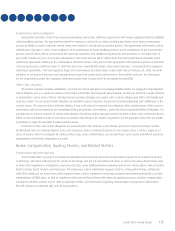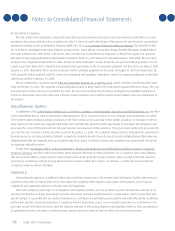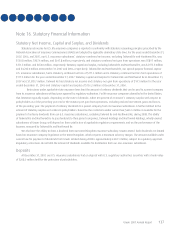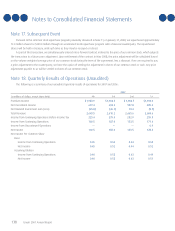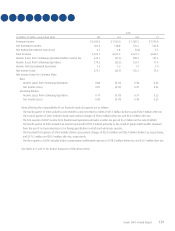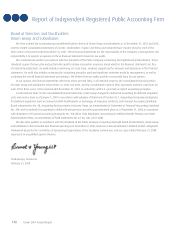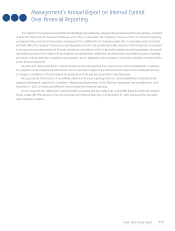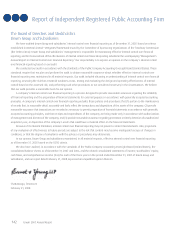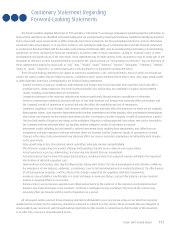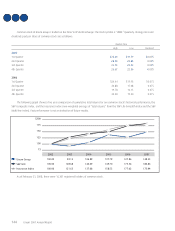Unum 2007 Annual Report Download - page 136
Download and view the complete annual report
Please find page 136 of the 2007 Unum annual report below. You can navigate through the pages in the report by either clicking on the pages listed below, or by using the keyword search tool below to find specific information within the annual report.
Notes to Consolidated Financial Statements
134 Unum 2007 Annual Report
Policyholder Class Actions
On July 15, 2002, Rombeiro v. Unum Life Insurance Company of America, et al., was filed in the Superior Court of California and
subsequently was removed to federal court, alleging that the plaintiff was wrongfully denied disability benefits under a group long-term
disability plan. On January 21, 2003, an Amended Complaint was filed on behalf of a putative class of individuals that were denied or
terminated from benefits under group long-term disability plans, seeking injunctive and declaratory relief and payment of benefits. On
April 30, 2003, the court granted in part and denied in part the defendants’ motion to dismiss the complaint. On May 14, 2003, the
plaintiff filed a Second Amended Complaint seeking similar relief.
Between November 2002 and November 2003, six additional similar putative class actions were filed in (or later removed to) federal
district courts in Illinois, Massachusetts, New York, Pennsylvania, and Tennessee. The complaints alleged that the putative class members’
claims were evaluated improperly and allege that the Company and its insurance subsidiaries breached certain fiduciary duties owed to
the class members under the Employee Retirement Income Security Act (ERISA), Racketeer Influenced Corrupt Organizations Act (RICO),
and/or various state laws. The complaints sought various forms of equitable relief and money damages, including punitive damages.
These actions all were transferred to the Eastern District of Tennessee multidistrict litigation. On December 22, 2003, the Tennessee
Federal District Court entered an order consolidating all of the above actions for all pretrial purposes under the caption In re UnumProvident
Corp. ERISA Benefit Denial Actions and appointed a lead plaintiff. A consolidated amended complaint was filed on February 20, 2004.
Court ordered mediation has concluded with the settlement of all individual claims brought by seven of the fifteen named plaintiffs.
An eighth plaintiff has subsequently resolved her claims through the process established under the regulatory settlement agreements.
On September 4, 2007, the District Court certified a (b)(2) class consisting of all plan participants and beneficiaries insured under ERISA
governed long-term disability insurance policies/plans issued by Unum Group and the insuring subsidiaries of Unum Group throughout the
United States who have had a long-term disability claim denied, terminated, or suspended on or after June 30, 1999 by Unum Group or
one or more of its insuring subsidiaries after being subjected to any of the practices alleged in the complaint. The class as certified seeks,
among other forms of relief, an opportunity to have denied or terminated claims re-assessed by so-called independent reviewers. The
District Court has yet to rule on pending motions by the Company for judgment on the pleading, or for summary judgment. The Sixth Circuit
Court of Appeals has since granted the Company’s petition for leave to appeal the class certification order on an interlocutory basis.
On April 30, 2003, a separate putative class action, Taylor v. UnumProvident Corporation, et al., was filed in the Tennessee Circuit
Court and subsequently removed to federal court. The complaint alleges claims against Unum Group and certain subsidiaries on behalf of
a putative class of long-term disability insurance policyholders who did not obtain their coverage through employer sponsored plans and
who had a claim denied, terminated, or suspended by a Unum Group subsidiary after January 1, 1995, seeking equitable and monetary
relief. Plaintiff alleges that the defendants violated various state laws by engaging in unfair claim practices and improperly denying claims.
The court subsequently granted in part our motion for summary judgment in Taylor, dismissing plaintiff’s request for equitable relief
on her breach of contract claim and dismissing any claim plaintiff may make for punitive damages under the Tennessee Consumer Protection
Act. The former claim is the principal claim upon which class certification is sought. The court reserved ruling on the remainder of the
pending motion for summary judgment. The court also has under advisement the plaintiff’s motion for class certification.
Plan Beneficiary Class Actions
During the first quarter of 2007, we executed a settlement agreement resolving the plan beneficiary class action, or 401(k)
Retirement Plan case, entitled Gee v. UnumProvident Corporation, et al. The settlement agreement, the net cost of which is immaterial,
was approved by the court in December 2007.


